Top Foods to Boost Collagen Production
Looking to enhance your skin’s radiance and support overall health? Discover the top foods that naturally boost collagen production. In this post, we explore how nutrient-packed options like bone broth, fish, leafy greens, and berries can help firm your skin, strengthen your joints, and keep your body feeling youthful.
HEALTHBEAUTY
9/2/20248 min read


Top Foods to Boost Collagen Production
The Magic of Collagen
What is Collagen and Why Does it Matter?
Collagen is like the body's natural scaffolding, holding everything together. It's the most abundant protein in our system, found in our skin, bones, muscles, and connective tissues. Think of it as the glue that keeps us youthful and strong. Over time, our natural collagen production slows down, which can lead to wrinkles, joint discomfort, and a general feeling of decline. That’s why it’s so important to focus on boosting collagen through our diet to maintain our health and keep that youthful glow.
How Collagen Affects Your Skin, Joints, and Overall Health
Collagen is crucial for keeping our skin firm and elastic. It helps smooth out fine lines and wrinkles, giving us that youthful radiance. In our joints, collagen acts as a cushion, reducing pain and stiffness. It also plays a role in keeping our bones strong. By eating foods that support collagen production, we can help our bodies stay in top shape, both inside and out.
Bone Broth: The Ultimate Collagen Source
Why Bone Broth is a Collagen Powerhouse
Bone broth is like a miracle drink for collagen. Made by simmering animal bones and connective tissues, it’s loaded with collagen peptides, amino acids like glycine and proline, and essential minerals. These nutrients are perfect for boosting and repairing collagen in our bodies, making bone broth a fantastic addition to our diets.
How to Make Rich, Flavorful Bone Broth at Home
Making bone broth at home is surprisingly easy and incredibly rewarding. Start by roasting some beef or chicken bones to enhance their flavor. Then, put the bones in a large pot or slow cooker, add veggies like onions, carrots, and celery, and cover with water. Adding a bit of apple cider vinegar helps draw out the minerals from the bones. Let it simmer for 12-24 hours, strain it, and store it in the fridge or freezer. You can sip it as a warm drink or use it as a base for soups and stews.
Creative Recipes Featuring Bone Broth
Get creative with bone broth to enjoy its benefits in various ways. Use it as the base for hearty soups or stews, giving your dishes an extra nutritional boost. Add it to risottos or sauces for a rich, savory flavor. Even just sipping on a warm cup of bone broth with some herbs and spices can be a soothing and healthy treat.


Chicken: A Collagen-Rich Protein
The Collagen Benefits of Chicken Skin and Connective Tissues
Chicken, especially its skin and connective tissues, is a great source of collagen. The skin is particularly rich in collagen, and cooking chicken with bones helps extract even more of this beneficial protein. Eating chicken regularly provides your body with the amino acids it needs to produce collagen, supporting everything from skin elasticity to joint health.
Delicious Chicken Dishes to Enhance Collagen Production
There are plenty of tasty ways to include chicken in your diet. A classic chicken soup, made with bones and skin, is a great way to get collagen. Try roasted chicken thighs with crispy skin or a comforting chicken stew. These dishes not only taste great but also help boost your collagen levels.


Fish: Marine Collagen for Your Health
The Collagen Benefits Found in Fish
Fish, especially those with edible skin and bones, are fantastic for boosting collagen. Marine collagen from fish is highly absorbable, making it easy for your body to use. Adding fish to your diet can improve your skin’s elasticity and provide support for your joints.
Top Fish Varieties That Boost Collagen
Opt for fatty fish like salmon, mackerel, and sardines. These fish not only offer collagen but are also packed with omega-3 fatty acids, which have anti-inflammatory benefits. Including these fish in your meals can enhance your collagen intake and support overall health.
Simple Fish Recipes to Increase Your Collagen Intake
There are lots of delicious ways to enjoy fish. Bake salmon with herbs and lemon for a simple, nutritious meal. Grill mackerel or prepare a savory stew with sardines. These recipes are not only tasty but also help increase your collagen levels.


Leafy Greens: Plant-Based Collagen Enhancers
How Spinach and Kale Contribute to Collagen Health
Leafy greens like spinach and kale are packed with vitamin C, which is essential for collagen production. Vitamin C helps stabilize collagen molecules and keeps them strong. These greens also contain antioxidants that protect collagen from damage, making them a must-have for maintaining healthy collagen levels.
Delicious Ways to Incorporate Leafy Greens into Your Meals
There are many ways to add leafy greens to your diet. Blend spinach into smoothies or toss it into salads for a nutrient boost. Use kale in soups or stir-fries, or simply sauté it as a side dish. These greens are versatile and can easily become a regular part of your meals.
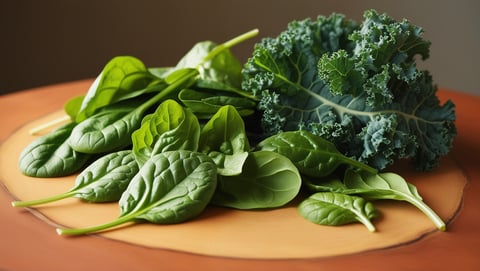

Bell Peppers: Vitamin C Powerhouses
The Role of Vitamin C in Collagen Production
Bell peppers, especially the red and yellow varieties, are loaded with vitamin C. This vitamin is vital for collagen production, helping to stabilize collagen molecules and enhance their incorporation into your skin and tissues. Including bell peppers in your diet can significantly boost your collagen levels and support a healthier complexion.
Flavorful Bell Pepper Recipes to Try
Enjoy bell peppers in a variety of delicious ways. Stuff them with grains, veggies, and protein for a nutritious meal. Add sliced bell peppers to salads or stir-fries for a crunchy, vitamin-rich addition. These recipes are not only good for you but also add vibrant flavors to your meals.
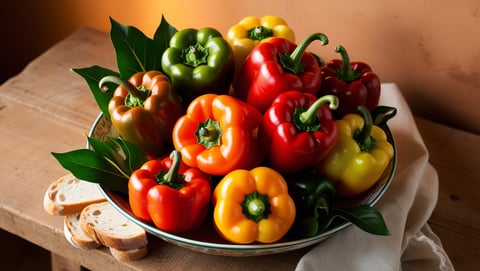

Berries: Antioxidant-rich collagen Boosters
The Collagen Benefits of Berries
Berries like strawberries, blueberries, and raspberries are packed with antioxidants and vitamin C. These nutrients help protect collagen from damage and support its production. Including berries in your diet can enhance collagen health and give your skin a radiant glow.
Tasty Berry Recipes for Radiant Skin
There are plenty of delicious ways to enjoy berries. Blend them into smoothies for a refreshing drink, or add them to yogurt and oatmeal for a nutritious breakfast. Try berry-based desserts or fruit salads to enjoy their collagen-boosting benefits in a sweet and satisfying way..
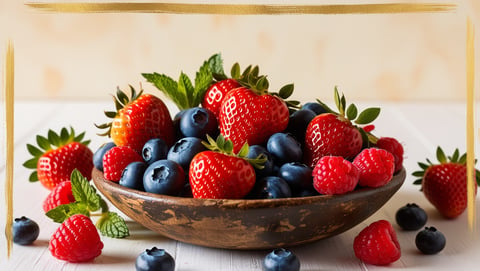

Citrus Fruits: Zesty Collagen Support
How Citrus Fruits Enhance Collagen Levels
Citrus fruits like oranges, lemons, and grapefruits are excellent sources of vitamin C, which is crucial for collagen production. Eating these fruits regularly can help boost collagen levels and improve skin elasticity. Their bright, tangy flavours also add a refreshing twist to your diet.
Refreshing Citrus Recipes to Include in Your Diet
Incorporate citrus fruits into your meals with invigorating recipes. Make citrus-infused water for a hydrating drink or prepare fresh fruit juices to enjoy their vitamin C benefits. Add citrus segments to salads or use them in marinades for a burst of flavour that supports collagen health.


Nuts and Seeds: Small but Mighty Collagen Helpers
The Collagen-Boosting Properties of Almonds and Chia Seeds
Nuts and seeds, such as almonds and chia seeds, are packed with nutrients that support collagen production. Almonds are rich in vitamin E, which helps protect collagen from damage, while chia seeds provide omega-3 fatty acids and antioxidants. Including these in your diet can boost your collagen levels and promote overall skin health.
Nut and Seed Recipes for Enhanced Collagen Production
Add nuts and seeds to your diet with these simple recipes. Snack on almonds or sprinkle chia seeds over yogurt for a quick, nutritious boost. Incorporate these ingredients into salads or baked goods for added texture and flavour, and enjoy their collagen-enhancing benefits.
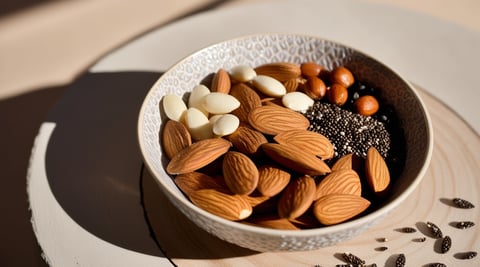

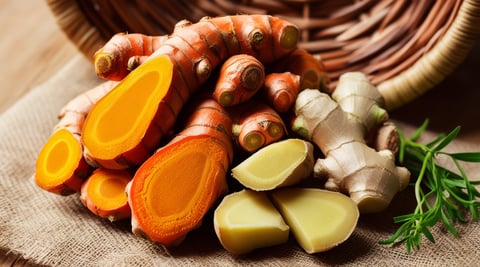

The Benefits of Turmeric for Collagen Health
Turmeric contains curcumin, a powerful anti-inflammatory compound that supports collagen health. Curcumin helps reduce inflammation and oxidative stress, which can benefit collagen production. Adding turmeric to your diet can enhance collagen levels and contribute to a more youthful appearance.
Ginger’s Role in Supporting Collagen Synthesis
Ginger is another spice that can boost collagen production. Its anti-inflammatory and antioxidant properties support collagen synthesis and protect it from damage. Incorporate fresh ginger into teas, soups, or stir-fries to benefit from its collagen-enhancing effects.
Easy Ways to Add Spices and Herbs to Your Cooking
Spices and herbs can easily enhance your meals while supporting collagen health. Add turmeric to curries, soups, or rice dishes for a nutritious boost. Include ginger in smoothies, teas, or stir-fries for added flavour and health benefits. These ingredients not only make your meals more exciting but also support your collagen levels.
Legumes and Whole Grains: Plant-Based Collagen Allies
How Beans and Lentils Support Collagen Production
Beans and lentils are excellent sources of plant-based proteins and amino acids essential for collagen synthesis. They also provide fiber and other nutrients that support overall health. Adding legumes to your diet can help maintain collagen levels and offer additional health benefits.
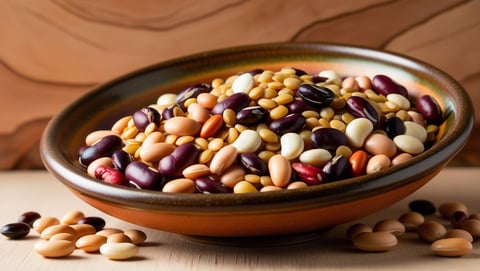

Whole Grains That Help Maintain Collagen Levels
Whole grains like quinoa, brown rice, and oats are rich in antioxidants and nutrients that support collagen production. They also provide fiber, which aids digestion and overall health. Incorporate these grains into your meals to support collagen levels and enjoy a balanced diet.
Simple Legume and Grain Recipes to Boost Collagen
Prepare nutritious dishes with legumes and whole grains. Try lentil soups, bean salads, or quinoa bowls for a healthful meal. Add whole grains to your breakfast with oatmeal or use them in savoury dishes to increase your collagen intake and enjoy a satisfying meal.
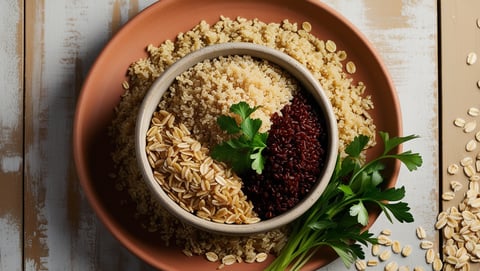

Hydration: Essential for Collagen Health
Why Proper Hydration is Crucial for Collagen Production
Staying hydrated is essential for maintaining healthy collagen levels. Water keeps your skin hydrated and supports collagen’s elasticity and strength. Without enough hydration, your skin can become dry and less elastic. Drinking plenty of fluids is crucial for keeping your collagen in top shape.
Herbal Teas and Infused Waters to Support Collagen Levels
Stay hydrated with herbal teas like chamomile or peppermint, which also offer health benefits. Infused waters with fruits and herbs provide a refreshing way to increase your fluid intake. Both options help maintain hydration and support healthy collagen levels.


Conclusion: Embracing a Collagen-Boosting Diet
Recap of Top Collagen-Boosting Foods
Adding foods like bone broth, chicken, fish, leafy greens, and berries to your diet can greatly boost your collagen production. Each of these foods offers unique benefits, helping you maintain healthy skin, joints, and overall wellness.
Tips for Incorporating These Foods into Your Daily Routine
Start by adding one or two collagen-boosting foods to your meals each week. Experiment with different recipes and flavours to find what you enjoy most. Making these nutritious foods a regular diet can help you maintain healthy collagen levels and enjoy a more vibrant, youthful you.
The Long-Term Benefits of a Collagen-Rich Diet
A diet rich in collagen-boosting foods can lead to lasting benefits, including improved skin elasticity, reduced joint pain, and enhanced overall health. Embrace these dietary changes to support your body’s natural processes and enjoy a healthier, more youthful appearance. If you don't have time or have a poor diet, check out my other article Best Collagen for Glowing Skin: Our Top Picks
Read More
